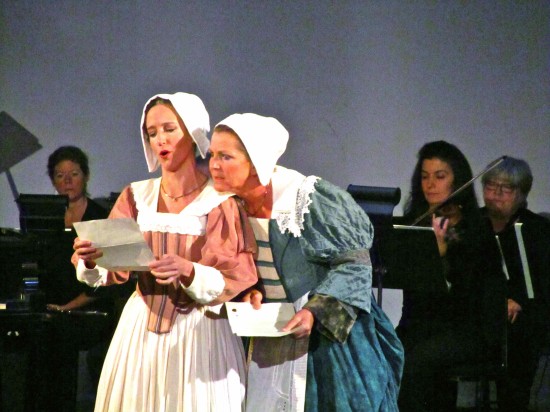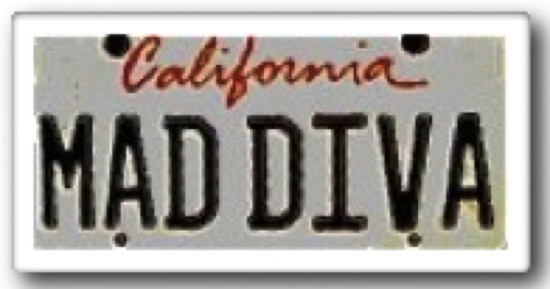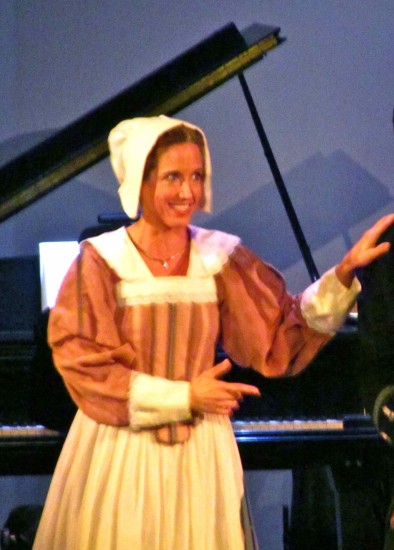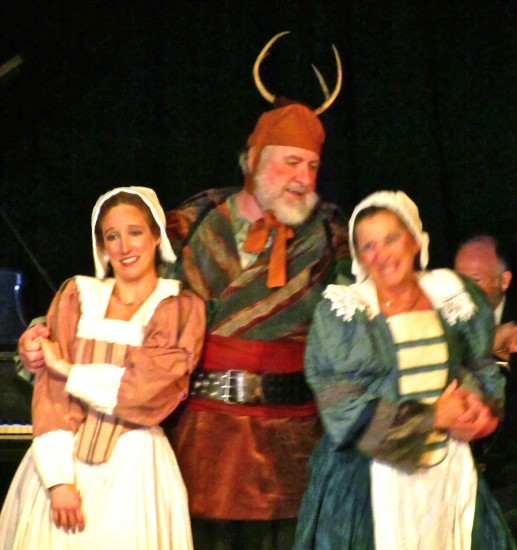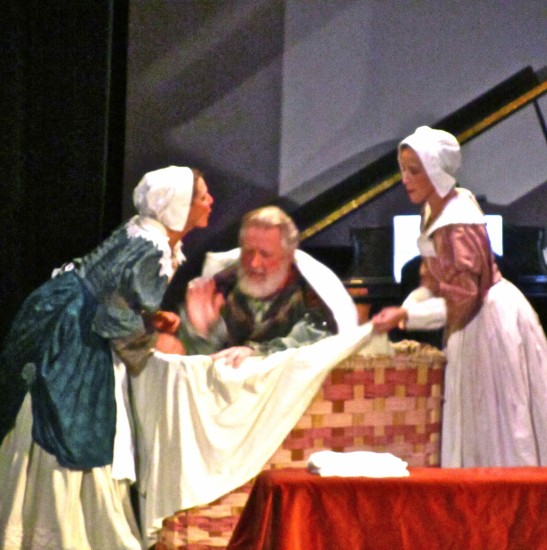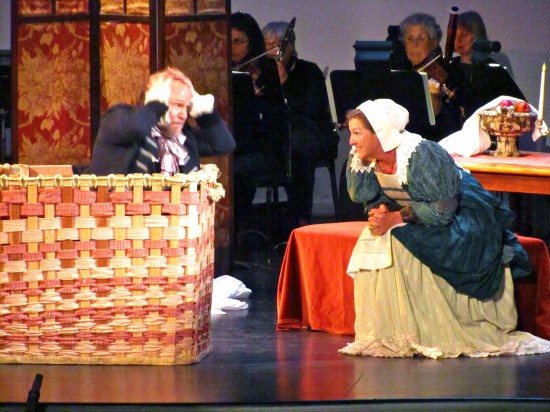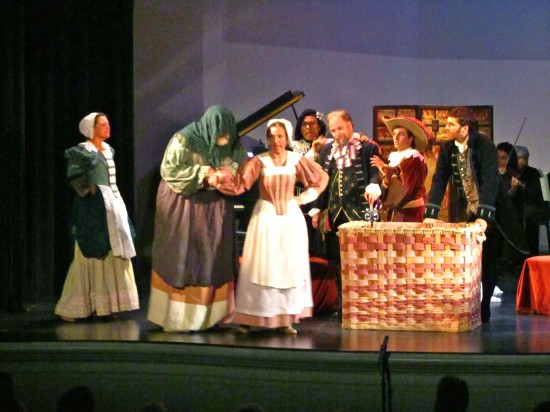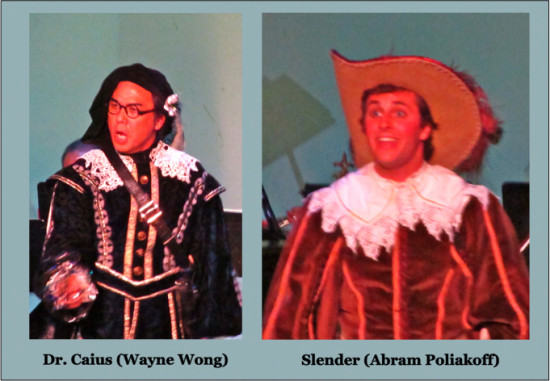Sir John Falstaff is a fictional character who appears in three of Shakespeare’s plays: King Henry IV – Part One, King Henry IV – Part Two, and The Merry Wives of Windsor. I don’t know about the historical plays, but Wikipedia lists 5 operas whose plot is based on the comedy:
- Falstaff (1893), Giuseppe Verdi’s last opera, with a libretto by Arrigo Boito.
- Falstaff (1799), by Antonio Salieri.
- Die lustigen Weiber von Windsor (1849) by Carl Otto Nicolai.
- Sir John in Love (1924-1928), an opera by Ralph Vaughan Williams.
- Plump Jack (1984) by Gordon Getty.
Among the general opera-going public, Verdi’s version is certainly the best known of these, but Donald Pippin’s favorite must be the one by Nicolai, since this performance in 2013 is the 6th time that Pocket Opera has produced The Merry Wives of Windsor. The first was 30 years ago in 1983, and the most recent previous one was in 2007.
I doubt that any other performance anywhere has produced wives merrier than Marcelle Dronkers and Meghan Dibble as Mistresses Ford and Page, respectively, who were reprising their performances in the 2007 production.
I have seen and heard Marcelle Dronkers in countless performances and have also had several opportunities to chat with her off-stage. Her magnificent soprano voice grows better every year, and she is a superb actress. Whether her part be the villainess Armida in Handel’s Rinaldo or the tragic Queen Elizabeth in Donizetti’s Roberto Devereux, she fully inhabits the character, and she truly excels in comic roles such as Fiordiligi in Mozart’s Cosi fan tutte, and here as Alice Ford. Her ebullient personality is characterized by the vanity plate on her car – which is also the name of her website.
I first met and heard Meghan Dibble in March 2007 at the Pocket Opera Caf� where she was one of the singers, shortly before her Pocket Opera debut in 2007 in the same role she sang this week. I have seen her several times in various roles with Pocket Opera and as Dorabella in Cosi fan tutte with West Bay Opera. Her mezzo voice blended well with Dronkers’ soprano, and the two women acted in perfect harmony.
I wonder by what miracle Donald Pippin was able to entice Gregory Stapp to take the role of Falstaff. Stapp has a magnificent deep bass voice, and he towers over (and around!) everyone else on stage, as a proper Falstaff should. Although new to Pocket Opera, he is far from new to San Francisco, having sung some 30 roles for San Francisco Opera. He has performed in opera houses all over the world in such diverse roles as Figaro in The Marriage of Figaro, the Grand Inquisitor in Don Carlo, Sparafucile in Rigoletto and Fasolt and Hunding in Wagner’s Ring Cycle.
With such an all-star trio as the three principals, how could the production be anything but good?
After a rousing overture (which sounded quite familiar, since it is often played as an independent orchestral piece) the action begins with the two wives reading and comparing the identical love notes that Sir John Falstaff has sent each of them. They are both amused and indignant and resolve to teach him a lesson, singing together:
A trap with baited hook we’ll set
That he is bound to fall for;
And when we’ve caught him in the net,
The neighborhood we’ll call for.
We’ll find the appetizing bait
To lure the fellow to his fate.
Together we shall hatch a plan
To spring a trap and catch a man . . .
Alice pretends to fall for Sir John’s note and invites him to come to her house the next morning when her husband will be away. She leads him on and just when things begin to get serious Meg shows up. Falstaff tries desperately to whisper sweet nothings to one then the other. He thinks he’s succeeding but whenever his back is turned the two wives struggle to control their laughter. Events take a somber term when Master Ford (Jonathan Spencer) appears, convinced that his wife is cuckolding him. Hastily they hide the romantic knight in a basket of dirty laundry. Ford searches the house in vain, completely overlooking the enormous basket in the living room, but to be on the safe side Mrs. F summons a batch of servants to take the basket out and dump its contents in the Thames. So far, so good, but the ladies want more, and arrange for another visit the next morning, when Ford has loudly announced that he will be out of town.
The role of Ford is well played and sung by Jonathan Spencer who is no stranger to the Bay area, having played several major supporting roles for Pocket Opera as well as lead Gilbert & Sullivan roles with The Lamplighters. As Ford, he is still convinced that Falstaff has seduced his wife, and he has devised a fantastic scheme for catching him at it. Disguising himself as a visiting merchant “Mr. Brook”, he tells Falstaff that he has seen and fallen for Mistress Ford, but has gotten nowhere as she claims that she is a virtuous wife. He has heard that Sir John is utterly irresistible to women and offers to hire him to seduce the virtuous wife – once that has been done, “Mr. Brook” can easily refute her claim of virtue and thus satisfy his own carnal desire. Falstaff, of course, falls for this baloney and sings,
How glad am I, how light as air!
On wings of love I fly, sir,
An eager, willing wife to share,
Her husband none the wiser.
You’ll know him well tomorrow morn,
For he’s the chap that wears the horn.
and Ford replies to the same music:
How glad am I, how light as air!
I fly as high as you, sir.
(Today’s the day I’m bound to snare
That bottom-heavy boozer.
And then he’ll get his just reward.
With compliments of Mister Ford.)
Meanwhile, back at the Ford residence, Alice is rehearsing just how she will lead Falstaff on. To this end she has enlisted the aid of two of her serving maids (Maria Janus and Elenka Proulx) and the large coat which Falstaff had left behind yesterday – each woman has inserted her outside arm in the jacket, creating a two-headed parody of the fat knight. This amusing nonsense stops when Meg and Falstaff enter, and Alice starts the real performance. We’ll never know what she had planned for the climax because Ford shows up – this time to her surprise and consternation. To gain time she shoos Meg and Sir John upstairs.
Ford storms in, certain that Falstaff is there, but Mrs. F distracts him and he spots the laundry basket. In the scene with “Mr. Brook” Falstaff had told him how he had avoided capture before and Ford, tacitly assuming that his wife is as stupid as he, is sure that they would use the same trick again. He madly flings the dirty laundry out, but can’t believe there’s no one under it until he actually jumps in the basket himself.
Alice takes advantage of his ravings to call upstairs to Meg that since their plans for a quiet tea together are spoiled, she might as well leave, “and take the old woman with you.” Meg catches the hint, and minutes later Sir John walks out of the house in a disguise that fooled no one in the audience but was totally convincing to the still fuming Master Ford.
Before getting into the final act, I’ll introduce the one remaining sub-plot from Shakespeare’s complex play. The Pages have a lovely young daughter Anne (Molly Wilson) who is totally and mutually in love with young Master Fenton (Jonathan Smucker). Both lovers seem to be perfectly cast, so that based on this performance you can’t tell if they are first-rate actors, or are just being their natural selves. Ms Wilson is still a graduate student at the San Francisco Conservatory of Music making her Pocket Opera debut; I hope we’ll see more of her next year. In contrast, Smucker has sung more than 40 roles in operas, oratorios, and musical theater. I have seen him in many Pocket Opera productions, and also as a very convincing Don Ottavio in West Bay Opera’s Don Giovanni. He’s obviously not nearly as young as he looks – just to look at him is enough to convince you that he’s an eighteen-year old boy in love for the first time. And their two voices fit beautifully together in a couple of lovely duets.
However, the course of true love does not run smooth. Both of Anne’s parents dismiss Fenton as totally unworthy of her, but they disagree as to who his replacement should be. The two suitors are a French intellectual, Dr. Caius (Wayne Wong), preferred by her mother, and Slender (Abram Poliakoff), a foppish youth whose great riches appeal to Mr. Page. Wong has appeared in 23 Pocket Opera roles in the past dozen years, but this is the first time he’s acquired an exaggerated French accent and vocabulary. Poliakoff has been in the chorus a couple of times, but this is his first listed role with Pocket Opera. Both suitors are perfectly cast for their minor supporting roles.
Act III takes place at midnight by a haunted oak tree in Windsor Forest. Everyone in the village is in on the main plot, which is to further humiliate Sir John and force him to stop his absurd pestering of women. The chief feature is an “entertainment” where everyone will wear a mask. However, the Page parents have the further purpose of abducting their daughter and getting her married by a priest who has a chapel near the forest. To this purpose, Mr. Ford gives Anne a green gown and mask and tells Slender to dress in red and carry off the lady in green. But Meg Ford gives Anne a red gown and mask and tells Dr. Caius to wear green and carry off the lady in red. But Anne is no fool. She tells Fenton to look for the lady in white and lead her off to the chapel. Which they do, while Slender and Caius each mistake the other for the desirable Anne and they traipse off to the chapel, doomed, I suspect, to a bitter disappointment.
Sir John, following instructions, appears with antlers on his head and seduction in his heart:
But hush! A rustle in the grove!
My dainty doe has come to rove
Instead, he is met by the villagers disguised as goblins, imps, and spirits of the night who rise in indignation:
Come, you spirits full of glee!
We’ll punish his audacity.
Pinch him, punch him, jab and jerk
Until the captive goes berserk.
Foxy fool, you are asking for trouble;
Lucky you, to escape with your life!
Plots and plans tend to burst like a bubble
When you pursue a spry, merry wife.
Rogue and traitor! Fabricator!
Now your fatal hour has sounded.
Lechery and treachery,
Your double-dealing’s here confounded . . .
But finally, all is forgiven in a happy ending:
The pranks of the night now over and done,
We bring down the curtain with lovers united.
Make way for a wedding, with feasting and fun;
To join in the revel, all friends are invited . . .
Forgive and forget! The time arrives;
Dear friends, may your hearts turn mellow.
If you have enjoyed the Merry Wives,
You, too, will forgive the fat fellow . . .
P. S. This was the final performance of The Merry Wives of Windsor and of Pocket Opera’s 36th season.
Photos:
- Except as stated otherwise, photos by Robert Selinske, Pocket Opera Board of Directors
- Photo arrangements by Philip Hodge
- Dialogue quotes from Donald Pippin’s libretto on Pocket Opera website
This review by Philip G Hodge appeared in sanfranciscosplash.com on July 18, 2013.

